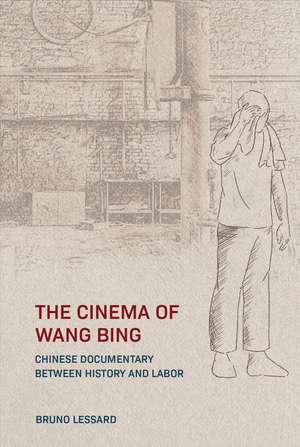The Cinema of Wang Bing: Chinese Documentary between History and Labor
Autor Bruno Lessarden Limba Engleză Hardback – dec 2023
In The Cinema of Wang Bing, Bruno Lessard examines documentarian Wang Bing’s most important films. He focuses on the two obsessions at the heart of Wang’s oeuvre—the legacy of Maoist China in the present and the transformation of labor since China’s entry into the market economy—and how the crucial figures of survivor and worker are represented on screen. Bruno Lessard argues that Wang is a minjian (grassroots) intellectual whose films document the impact of Mao’s Great Leap Forward on Chinese collective memory and register the repercussions of China’s turn to neoliberalism on workers in the post-Reform era. Bringing together Chinese documentary studies and China studies, Lessard shows how Wang’s practice reflects the minjian ethos when documenting the survivors of the Great Famine and those who have not benefitted from China’s neoliberal policies—from laid-off workers to migrant workers. The films discussed include some of Wang’s most celebrated works such as West of the Tracks and Dead Souls, as well as neglected documentaries such as Coal Money and Bitter Money.
Preț: 323.48 lei
Nou
Puncte Express: 485
Preț estimativ în valută:
61.91€ • 64.46$ • 52.32£
61.91€ • 64.46$ • 52.32£
Carte indisponibilă temporar
Doresc să fiu notificat când acest titlu va fi disponibil:
Se trimite...
Preluare comenzi: 021 569.72.76
Specificații
ISBN-13: 9789888805778
ISBN-10: 9888805770
Pagini: 188
Dimensiuni: 152 x 229 mm
Greutate: 0.43 kg
Editura: Hong Kong University Press
Colecția Hong Kong University Press
ISBN-10: 9888805770
Pagini: 188
Dimensiuni: 152 x 229 mm
Greutate: 0.43 kg
Editura: Hong Kong University Press
Colecția Hong Kong University Press
Notă biografică
Bruno Lessard is associate professor in the School of Image Arts at Toronto Metropolitan University, where he directed the MFA program in documentary media.
Cuprins
Acknowledgments vi
Editorial Note vii
Introduction 1
Part One: The Labor of History
Chapter 1. The Great Leap Forward: Famine and the Oral History Film 27
Chapter 2. Fengming, a Chinese Memoir: The Embodied Archive 43
Chapter 3. The Ditch: Techniques of Creative Repetition 61
Chapter 4. Dead Souls: Documenting Human and Nonhuman Survivors 77
Part Two: The History of Labor
Chapter 5. Observing the Workers: Chinese Governmentality and Critical
Realism 97
Chapter 6. West of the Tracks: Embracing a Lost Social Totality 110
Chapter 7. Coal Money: Tracking an Energy Commodity in the Chinese
Anthropocene 131
Chapter 8. Bitter Money: The Spatial Politics of Migrant Labor 144
Conclusion 161
Bibliography 165
Index 174
Editorial Note vii
Introduction 1
Part One: The Labor of History
Chapter 1. The Great Leap Forward: Famine and the Oral History Film 27
Chapter 2. Fengming, a Chinese Memoir: The Embodied Archive 43
Chapter 3. The Ditch: Techniques of Creative Repetition 61
Chapter 4. Dead Souls: Documenting Human and Nonhuman Survivors 77
Part Two: The History of Labor
Chapter 5. Observing the Workers: Chinese Governmentality and Critical
Realism 97
Chapter 6. West of the Tracks: Embracing a Lost Social Totality 110
Chapter 7. Coal Money: Tracking an Energy Commodity in the Chinese
Anthropocene 131
Chapter 8. Bitter Money: The Spatial Politics of Migrant Labor 144
Conclusion 161
Bibliography 165
Index 174
